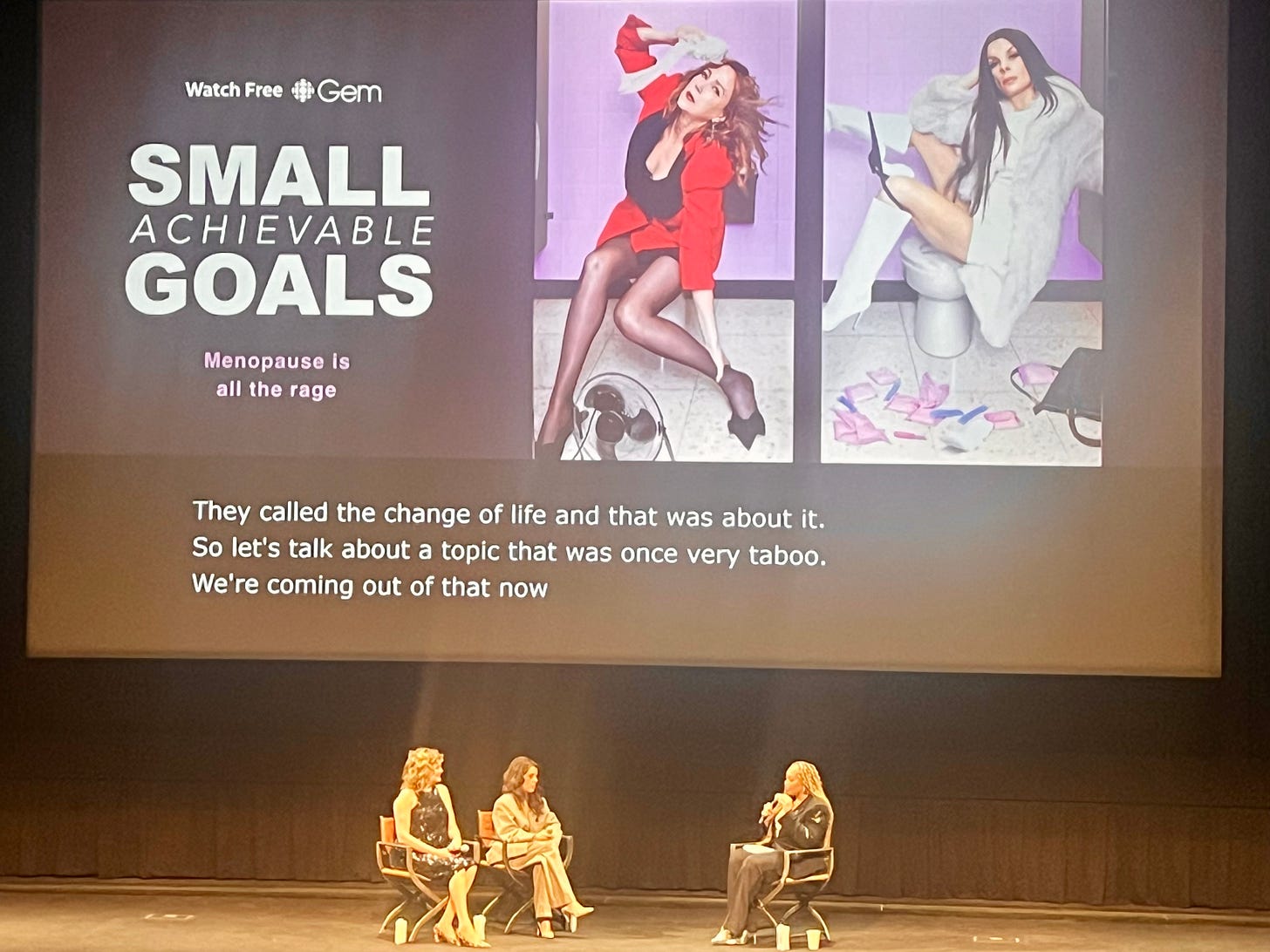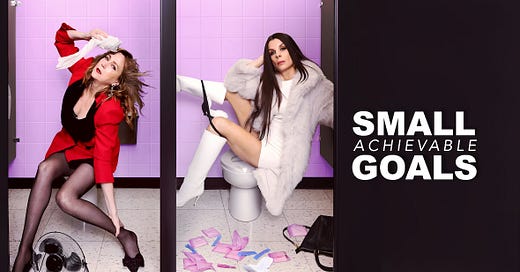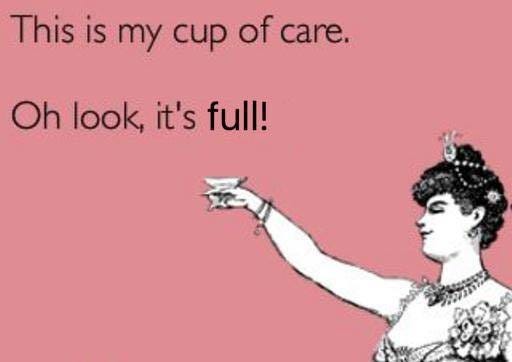Permission to Rage: What Midlife Fury Is Really Trying to Tell You
There will be blood… and fury. Why perimenopausal rage might just be your superpower
Sitting in a TIFF screening room for the premiere of CBC's groundbreaking comedy Small Achievable Goals last week, I watched Jennifer Whalen's character Julie Muldoon completely lose her sh*t — and felt something deeply resonant rise through my otherwise sagging pelvic floor. Here, finally, was perimenopause portrayed with unflinching honesty on primetime television.
The Q&A after the screening, hosted by Tracy Moore (you might know her as the vibrant host of Cityline, Canada’s longest-running daytime talk show), turned out to be as revealing as the show itself, with candid conversations about rage, liberation, and the unexpected gifts of this transition.
I watched, transfixed, as something electric and familiar sparked to life inside me.
Not embarrassment. Not discomfort.
Recognition.
This wasn't just another funny sitcom scene brought to you by two Baroness Von Sketch-ers (yes, the women who brought perimenopause to the mainstream with their viral "Is it?" sketch). Watching Whalen's character call out the mediocre men at the top while sweating through her blouse mirrored something many of us who were assigned female at birth experience in midlife but rarely discuss: the volcanic rage that seems to emerge from nowhere.
You know, the kind of outburst that may have left you wondering, "Who the hell is this person, and what has she done with me?"
More than giving us a way to laugh at our symptoms, Small Achievable Goals is about reinvention, friendship, and saying “screw it” to the expectations that were never ours in the first place.
(Psst… whether it’s the discomfort of ignoring it or the pain of waking up to that realization, THIS is the big reason we’re so rage-y in midlife.)
Content note: While I'm sharing my experience as a cis woman, these hormonal transitions affect everyone with ovaries — including trans men and non-binary folks — often with added layers of gender-affirming care challenges and medical dismissal.
The rage we're not supposed to have
When I was asked to write a CBC article about Small Achievable Goals (Read it here: "Am I dying or is it perimenopause?"), I focused on the physical symptoms of hormonal change — the hot flashes, the night sweats, the brain fog. But what hit me hardest watching the show on CBC Gem was the emotional whiplash that comes with hormone fluctuations, particularly the intensity of anger that can feel so foreign and terrifying. “I’ve kept it down for so long! What gives? Why now?”
Society has very narrow lanes for women's emotions. We're allowed to be nurturing, patient, "appropriately" frustrated. But rage? Full-blown, furniture-moving rage? That's unbecoming. Unseemly. Unhinged. “Hysterical.”
(ICYMI: “hysteria” comes from the Greek word "hystera" meaning "uterus" — doctors literally once diagnosed women's anger as a uterus-related mental illness!)
Tracy Moore's no-holds-barred conversation with the creators perfectly matched the show's refreshing candour about midlife experiences. As Whalen explained, "I wanted to start my character where she's feeling like, 'What the f*ck did everything just end?'"
I kept nodding my head, recognizing that familiar bewilderment. Like when your emotions suddenly feel too big for your body — that sensation of being a pressure cooker without a release valve, where feelings that once simmered quietly now threaten to blow the lid off entirely. Or when you subconsciously wonder if you still have value after your birthing years are done, as though your worth had an expiration date stamped somewhere you never thought to look.
We have a lot to be mad about in a world that stops seeing us, and — like the show reminded me — there’s also a surprising amount of good stuff we’re not talking about enough.

Whalen describes this time as "a transformation and a rite of passage that is not celebrated," unlike other life milestones that receive cultural recognition.
"We have so many things in our culture about your child, or hitting puberty, or becoming an adult. We celebrate that, and this should be celebrated," she insisted.
The comedians set out to counter the relentlessly negative messaging around menopause. "When it started to happen to me, I thought, 'there has to be good things that come out of this,'" Whalen explained. "We really wanted to make a joyful comedy about menopause to change that narrative."
When Tracy asked why they wanted to reframe menopause as a beginning rather than the ending society has always considered it, MacNeill didn't mince words: "This narrative completely has to end because it doesn't serve anybody in this room."
Tracy then dropped a truth bomb that had me cheering: "I understand why the narrative has always been so against us standing in our power. If I had this at 27, I would have been dangerous, right?"
Boom! And maybe that's exactly the point.
The wisdom hidden in our fury
Here's what I'm learning about midlife rage: sometimes it's a hormonal tsunami, yes. But often, it's also our body's way of finally saying what our people-pleasing mouths have been trained never to utter.
That explosion isn't just estrogen withdrawal. It's decades of:
Swallowing our words to make others comfortable.
Working twice as hard for half the recognition.
Contorting ourselves to fit impossible beauty standards.
Carrying the invisible mental load of everything and everyone.
Being told we're "too much" when expressing legitimate concerns.
Believing we should be grateful for crumbs.
And, as I alluded to earlier, I think part of the fury comes when we recognize we didn’t have to follow any of those “shoulds” all along. But here's where things get interesting: alongside this rage comes an unexpected gift. What if we've been looking at this all wrong?
The liberation of not giving a f*ck
There's a shocking moment in the first episode where MacNeill's character, Kris, gets her peri period mid-meeting — which, personally, always feels like that scene in Pulp Fiction where they accidentally blow Marvin's head off. Blood and... chunks everywhere. (Hahaha, too much?).
Kris feels down beneath her to find blood on the chair. I don't know that I've ever seen that on primetime TV. The realization of my own internalized period shame hit me hard. I turned to my friend and said, "How much blood and gore have we seen on screen, but we're squeamish about periods?!"
At that same Q&A, Tracy shared a story that crystallized this whole experience. She was at a day party for her girlfriend's 50th birthday — surrounded by DJs and promoters from their club days (because yes, as Tracy said, we Gen X city kids lived for Wednesday to Sunday club culture, thankyouverymuch).
She got her period unexpectedly, bleeding through her pink and red patterned pants. And her reaction? Pure liberation.
"I didn't care," she declared with the same energy that made her an iconic TV host. "We were all talking about it. We were howling. I walked into the bathroom like, 'Oh my god, does anyone have a...?'"

What made me cheer (a bit too loudly) in my seat was Tracy's defiant declaration: "You cannot take me out." She repeated it with the kind of conviction that only comes after decades of giving too many f*cks: "Like, you cannot take me out."
That's the energy I want to bring to my 50s. The "blood on my cute outfit and I'm still having the time of my life" energy. The "this is actually perfect timing for perimenopause because I don't give a f*ck anymore" energy. The "I refuse to be sidelined or diminished" energy.
Because while our biology might be playing tricks on us, there's also something profoundly liberating about being at an age where we finally stop performing for others. (You can find more of that energy from me and Tracy in our menopause interview for the Star here.)
Finding the message in the bottle (you want to throw)
In Armenian culture, there's a particular kind of intensity that's acceptable — a passionate expressiveness that Western society often views as "too much."
Add a lack of filtering thanks to a neurodivergent brain, and — what can I say? — I'm still learning to modulate myself, to tone it down, to be "appropriately" Canadian in my emotional expression. It’s like I became fluent in two emotional languages but was only allowed to speak one in public.
Now my perimenopausal body seems to be channelling my ancestors, saying: "Enough of that nonsense." The collision of cultural silencing and hormonal liberation creates a uniquely powerful force — one that demands to be heard after decades of careful translation.
One of the most touching moments in Small Achievable Goals happens in a workplace bathroom scene. At the Q&A, MacNeill had the audience howling with laughter when she described how women experience these profound moments in public washrooms.
"It's so intense," she said. "Everyone's crying, everyone's vomiting. Another woman is helping you pull your pants up. You don't know what's going on, and they just thrust you back out into the world." (It’s like she was describing Spring Break ‘95 in Acapulco.)

Tracy nailed the rhythm of women's emotional lives: "We get real deep, and then we go out and get shallow again."
That's perimenopause in a nutshell. Deep, shallow. Rage, composure. Except now, you're booking appointments (for your kids, parents, yourself — take your pick!) or negotiating multi-million dollar deals while your body temperature fluctuates* more dramatically than Toronto weather in April. (*Not all women experience hot flashes.)
As Tracy shared in the Q&A, this stage brings a shift in relationships, too: "In this stage in our life, we have a constellation of people in our life... but it really is your women who show up for you, and those relationships become so crucial at this time."
Whalen agreed, noting that perimenopause ripples beyond the individual — "it affects your family and all the people that you love." What's more, she added, the show will resonate even with those who'll never experience hot flashes because "everybody has gone through a change that's just going to happen, and there's nothing you can do about it... how do you navigate that, and how do you keep a sense of self?"
So what now?
If you're experiencing perimenopausal rage, here's my permission slip for you:
Feel it fully. Stop apologizing for your emotions. They're data about what matters to you.
Get curious about it. When you're not in the heat of the moment, ask: What was the trigger? What boundary was crossed? What need isn't being met?
Express it safely. Find physical outlets — whether that's screaming in your car, taking a boxing class, or simply allowing yourself to cry without judgment.
Look for the wisdom in it. Our rage often points to what we value most deeply. It can be a compass showing us where change is needed.
Find your fellow ragers. Connect with other women going through this transition. There's immense relief in knowing you're not alone.
(And if you inevitably f*ck up, upset someone, and need to do some apologizing, I have a guide for not drowning in shame about it here.)
As MacNeill said, "I think we underestimate the power of someone being able to see themselves." That's why shows like Small Achievable Goals matter. After centuries of gaslighting and medical dismissal, we need to keep talking about our rage, our symptoms, and our transformations so that those experiencing them feel less invisible, less alone.
For generations, women's anger has been pathologized, dismissed, or labelled as "hormonal." But what if it's actually a sacred gift of midlife — the permission to finally tell the truth about what's not working anymore?
Your rage isn't a problem to be solved. It might just be the solution you've been searching for.
Now if you'll excuse me, I need to find something to smash. Therapeutically, of course.
Has rage been part of your perimenopause journey? I'm creating a judgment-free zone in the comments section for us to share our experiences. Or hit reply to message me directly. What has your fury taught you? What boundary have you set recently that you’re proud of?
Want more on this topic? Check out my CBC Gem article "Am I dying or is it perimenopause?" where I break down the symptoms many of us never expected, and watch Small Achievable Goals to see perimenopause portrayed with both honesty and humour. I’d love to know what you think of the show!







